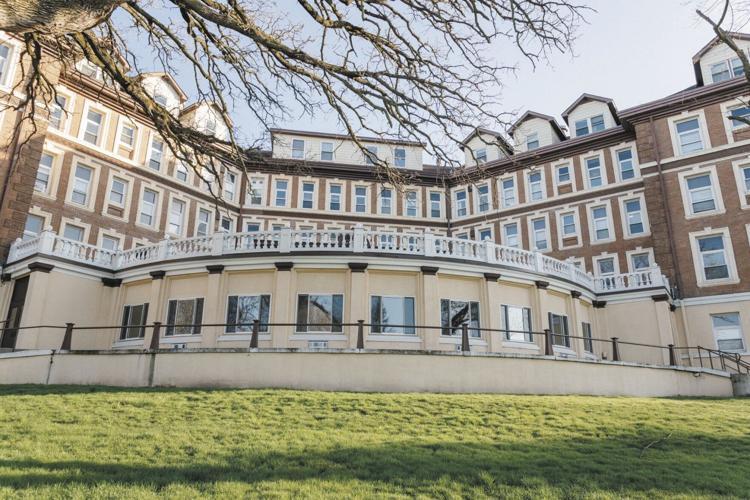WAUKESHA — Perched atop a great hill, the building at 915 N. Hartwell Ave. has kept a watchful eye over Waukesha for more than a century. Its halls have witnessed thousands of feet float from room to room, and its walls and windows have witnessed decades of harsh Wisconsin winters. Now, the time has come for some renovations. And the local landmark’s current caretaker — Ethnos360 Bible Institute — is pledging to revitalize the aging campus.
Regional Director of Development Andrew Moser says Ethnos360, a two-year Christian college and missionary training program, launched the "Revitalize EBI" campaign in February. It hopes to raise $5 million over the course of five years to restore the building, which he says represents an important period in the city’s life.
"Our building is the last hotel remaining from the Springs Era," he said. "It holds a unique place in Waukesha history."
The Springs Era began in 1868 and ended around the start of World War I. A time marked by the rise of spring water companies and resort culture, the grand building on Hartwell Avenue first opened in July 1909 as a hotel known as Resthaven.
Moser says that "reports of its luxury were legendary," and the building was outfitted with oriental rugs, museum- quality paintings, and Tiffany fixtures. A fire broke out in 1912, and Resthaven never quite saw the same level of success it had in the years prior.
Local historian John Schoenknecht authored a column for The Freeman in May 2010 detailing Resthaven’s history. He reported that the building switched hands several times after the fire, briefly operating as a school for boys in 1916, a fire station in 1918 and finally becoming a hospital in 1919.
In 1958, medical care in the building ceased and it sat empty for a handful of years before being bought by Ethnos360 Bible Institute, at the time known as New Tribes. Since 1963, Ethnos360 has been steward of the building, working to preserve its history. But now, its encountering some particularly large projects. Twenty-eight of them, to be exact.
"It needs some repairs, and some (are) major," Moser noted.
For example, the elevators — which were installed during World War II — need to be replaced. The director says that the technology is unreliable and makes navigating the campus difficult for students with disabilities. Fire systems will also need to be upgraded to address safety concerns.
Ethnos360 also plans on replacing windows. There are 460 of them on the property, and "they’ve reached the end of their functional age," Moser said. He estimates that over 100 of the windows are no longer functional and had to be screwed in place. Moreover, the windows are made of vinyl, and the Christian college is hoping to swap them out for something truer to the time period in which the building was constructed.
Since launching the campaign a couple months ago, Moser notes that Ethnos360 has raised over $500,000. On Feb. 9, it received a $100,000 pledge from Waukesha State Bank. The other funds have come from private donors, and Moser says the college is grateful for their generosity.
"We’re really excited about some of the momentum, and people are already rallying to our side," the director explained. "A lot of people care about the history of Waukesha. That’s really cool to see."
Moser says that since it planted roots in Waukesha 60 years ago, Ethnos360 has been a pillar of the community. Students can be seen driving school buses for First Student, facilitating after-school programs and helping out at the YMCA.
With the Christian college offering support to Waukesha, Ethnos360 is looking for the community to do the same for them. Moser says that contributions to the Revitalize EBI campaign are needed to help maintain the building, especially since Ethnos360 operates on a tight $2 million annual budget.
The Christian college has a unique model, prohibiting students from taking out loans. Instead, at $5,700 per semester (including both tuition and room and board), costs are low enough that students can work their way through school.
"They pay as they go, because we really believe it’s a core value that when students graduate to be missionaries, or if they become pastors … they need to not have a huge financial burden because those aren’t lucrative fields," the director explained.
As another way of keeping costs low, staff are not paid salaries. Instead, they work on financial support from individuals in their network, as well as local churches.
Moser hopes that Waukesha recognizes Ethnos360’s investment in the city, and encourages community members to support the preservation of an important part of local history.
"We care deeply about the world, but also about Waukesha. … We take pride in being a part of the fabric of this community," he said. "We love the history we’re preserving, and we hope to spend another six decades here."
To learn more about the campaign and contribute to the Ethnos360 Bible Institute’s preservation of a local landmark, visit and click "give."












